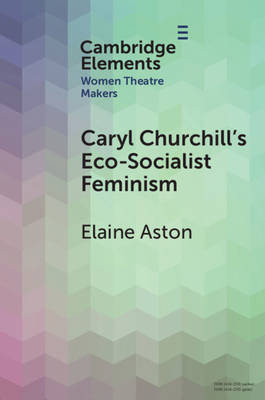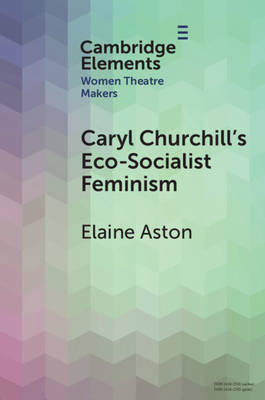
- Afhalen na 1 uur in een winkel met voorraad
- Gratis thuislevering in België vanaf € 30
- Ruim aanbod met 7 miljoen producten
- Afhalen na 1 uur in een winkel met voorraad
- Gratis thuislevering in België vanaf € 30
- Ruim aanbod met 7 miljoen producten
Zoeken
Omschrijving
Pivotal to Caryl Churchill's What If If Only (2021) is the ghost of a democratic future that never happened. Framed by What If If Only, if-only yearnings for a democratic future are seminal to this Element with its primary attentions to the feminist, socialist and ecological values of Churchill's theatre. Arguing for the triangulation of the latter, the study elicits insights into: the feeling structures of Churchill's plays; reparative strategies for the renewal of an eco-feminist-socialist politics; the conceptualisation of the 'political is personal' to understand the negative emotional impact that an anti-egalitarian regime has on people's lives; and relations between dystopian criticality and utopian desire. Hannah Proctor's notion of 'anti-adaptive healing' is invoked to propose a summative understanding of Churchill's theatre as engaging audiences in anti-adaptive, resistant feelings towards a capitalist order and healing through a utopic sensing that an alternative future is desirable and still possible.
Specificaties
Betrokkenen
- Auteur(s):
- Uitgeverij:
Inhoud
- Aantal bladzijden:
- 74
- Taal:
- Engels
- Reeks:
Eigenschappen
- Productcode (EAN):
- 9781009534239
- Verschijningsdatum:
- 6/11/2025
- Uitvoering:
- Paperback
- Formaat:
- Trade paperback (VS)
- Afmetingen:
- 152 mm x 229 mm
- Gewicht:
- 108 g

Alleen bij Standaard Boekhandel
+ 48 punten op je klantenkaart van Standaard Boekhandel
Beoordelingen
We publiceren alleen reviews die voldoen aan de voorwaarden voor reviews. Bekijk onze voorwaarden voor reviews.








